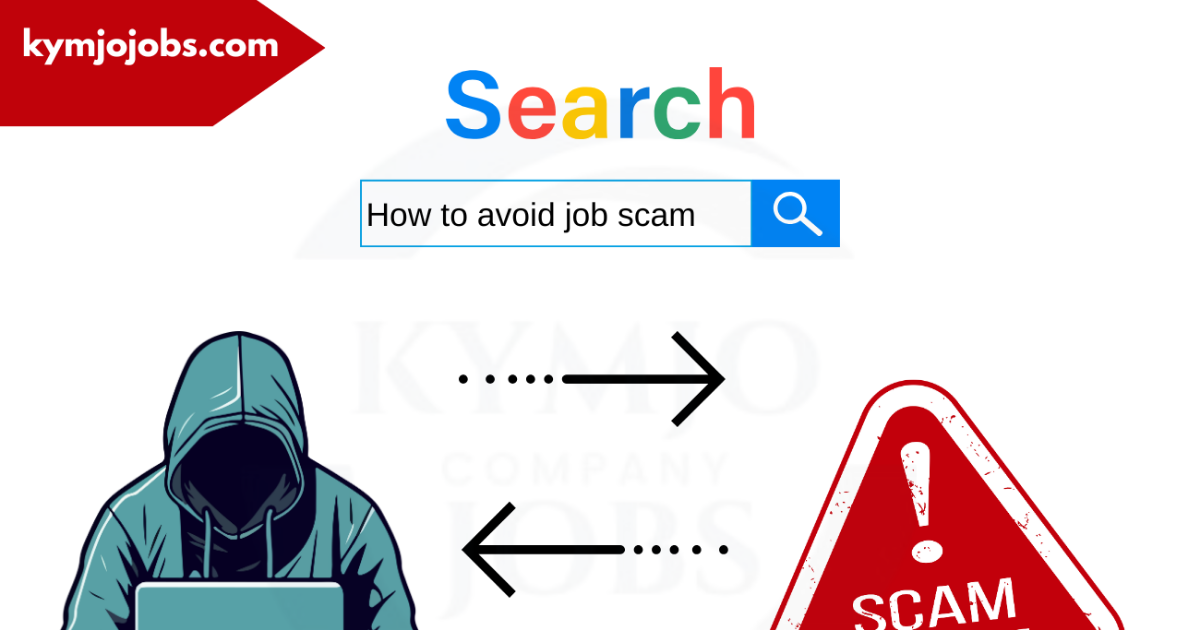In recent years the journey to finding a new job is filled with hope, ambition, and a great deal of effort. You spend hours perfecting your CV, writing compelling cover letters, and searching for the perfect opportunity. When a promising email lands in your inbox, the feeling is electric. But in today’s digital landscape, that excitement can be a vulnerability. Job scams are on the rise every single day, preying on the very hope that drives your search.
This isn’t just a minor inconvenience; it’s a sophisticated industry designed to steal your money, your personal data, and your confidence. That’s why we built Kymjojobs Our story began with a simple but powerful mission to create a secure and transparent bridge between Nigeria’s talented workforce and legitimate, verified employers. We were tired of seeing brilliant candidates being deceived by fraudulent actors. Every listing on our platform is verified because we believe your job search should be a journey of opportunity, not a minefield of risks.
This guide is an extension of that mission. We will arm you with the ultimate defense knowledge. By the end of this article, you will be able to spot the red flags of a job scam from a mile away, verify any opportunity with confidence, and navigate your career path securely.
The Psychology of the Scam: Why These Tricks Work
Before we dive into the specific red flags, it’s important to understand the psychology behind these scams. Fraudsters are masters of manipulation. They don’t just post fake jobs; they exploit human emotions and make it look real.
- Desperation: They know that many people are in urgent need of employment. They create a sense of urgency—”This offer expires in 24 hours!”—to rush you into making poor decisions without thinking.
- Hope: They dangle the promise of a dream job with an incredible salary and benefits, making you want to believe it’s real. This emotional investment can cloud your judgment.
- Greed: Sometimes, the offer is so outrageously good that it appeals to our sense of greed. The promise of high pay for little work is a classic bait-and-switch tactic.
By understanding that these scams are designed to target your emotions, you can take a step back and approach every offer with a clear, analytical mind.
The 7 Red Flags of a Job Scam
Think of these as warning signs. If you spot even one or two of these, you should proceed with extreme caution.
1. They Ask You for Money
This is the most significant and non-negotiable red flag this mostly happens in every country. A legitimate employer will never ask you to pay for a job. Scammers, however, have endless excuses for why you need to send them money.
- Common Excuses: “Training materials fee,” “CV processing fee,” “background check fee,” “interview uniform,” or “visa application deposit.”
- The Tactic: They will often ask for a small, seemingly reasonable amount to test your compliance. Once you pay, they will either disappear or ask for even more money for the “next step.”
- Your Action: The moment money is mentioned, end all communication. It is 100% a scam.
2. Vague or Unprofessional Communication
Legitimate companies have professional communication standards. Scammers often don’t.
- Poor Grammar and Spelling: Emails filled with typos and grammatical errors are a huge red flag. A professional HR department would never send out such communication.
- Generic Email Addresses: Look at the sender’s email address. Is it from a corporate domain (e.g.,
support@kymjojobs.com) or a free public domain like @gmail.com,@yahoo.com, or@outlook.com? While some small businesses might use Gmail, large, established companies will not. - Vague Job Descriptions: The job description lacks specific details about the roles and responsibilities. It uses generic, fluffy language like “work from home and earn big” without defining the actual job.
3. The Offer is Unbelievably Good
If an offer sounds too good to be true, it almost always is. Scammers use the lure of a high salary and minimal requirements to attract a wide range of victims.
- Example: A job offering a six-figure salary for a simple data entry role that requires no prior experience.
- The Reality: Real jobs have salaries that align with industry standards, your experience level, and the complexity of the role. A quick search for similar roles on a verified platform like Kymjojobs can give you a realistic salary benchmark.
4. The “On-the-Spot” Job Offer
The hiring process for a real job takes time. It typically involves multiple stages: application review, phone screening, one or more interviews, and reference checks.
- The Scam: You receive a job offer after a single, brief email exchange or a short chat message, without a proper interview.
- Why it’s a Red Flag: Employers invest significant time and resources into finding the right candidate. They will not offer a position to a stranger without a thorough vetting process. An instant offer means they are not interested in your skills; they are interested in you as a target.
5. They Ask for Sensitive Personal Information Too Early
Protecting your personal data is critical. Scammers often try to harvest this information for identity theft.

- Information to Guard: Your bank account details, National Identification Number (NIN), passport details, or other sensitive financial information.
- The Rule: You should only provide such information after you have received and signed a formal, written contract of employment from a verified company, and typically as part of the official onboarding process. Never include it in your initial CV or application email.
6. The Interview is Unconventional
While remote interviews are now common, the format can be a red flag.
- Text-Only Interviews: A major warning sign is a recruiter who insists on conducting the entire interview via a text-based chat app like WhatsApp, Google Hangouts, or Telegram.
- The Reason: This allows the scammer to hide their identity, location, and true intentions. A real interview will almost always involve a voice call or, more commonly, a video call where you can see and speak with the hiring manager. Always insist on a video call.
7. The Company’s Online Presence is Weak or Non-Existent
Every legitimate company in 2025 has a professional online footprint.
- No Official Website: If you can’t find a professional, functioning website for the company, be very suspicious.
- No LinkedIn Presence: Check for a company page on LinkedIn. Do they have employees listed? Does the recruiter who contacted you have a credible profile?
- Mismatched Information: If you do find a website, do the contact details and job openings listed there match the information in the email you received? Scammers often impersonate real companies, so it’s crucial to verify the source.
How to Verify Any Job Offer: Your Due Diligence Checklist
If you receive an offer that raises even a small suspicion, follow these steps to verify its legitimacy.
- Independent Research: Do not use any links or contact information provided in the suspicious email. Open a new browser window and search for the company’s official name on Google.
- Find the Official Website: Navigate to their official website and look for a “Careers” or “Contact Us” page.
- Cross-Reference the Job: Is the job you were offered listed on their official careers page? If not, it’s a major red flag.
- Call the Official Number: Find the company’s official phone number on their website and call them. Ask to speak to the HR department and confirm if they are indeed hiring for that position and if the person who contacted you is an employee.
Your Secure Job Search Starts Here
Navigating the job market requires you to be both hopeful and vigilant. By learning to recognize these red flags and taking the time to verify every opportunity, you build a powerful shield against scams. Trust your instincts—if something feels off, it probably is.
Your career journey is too important to leave to chance. Start your search on a platform that prioritizes your safety. On Kymjojobs, we handle the verification so you can focus on what you do best: showcasing your skills and building a great career.


